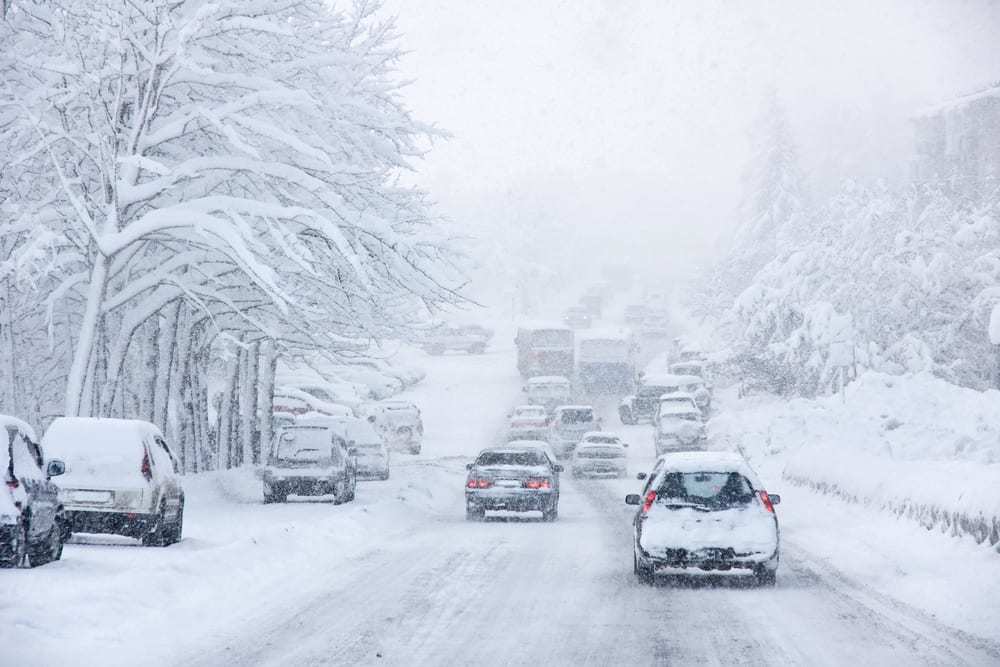Each season presents its own driving hazards. During wintertime, roads that are snowy, slushy, icy, or wet can contribute to accidents. Each year, an estimated 116,000 people in the U.S. are injured and 1,300 are killed in accidents on icy, slushy, or snowy roads. Determining fault in winter weather collisions can be a complex process. While insurance companies take inclement weather into account, they still work to determine who was at fault in a crash. If you or a loved one are injured in an auto collision this winter, contact the Law Offices of Bryan Musgrave for help.
Determining Fault in Winter Weather
During the winter months in Missouri, inclement weather may be a factor in determining fault in winter weather car collisions. Determining who is liable will depend on the degree of negligence that can be attributed to each involved driver. While drivers obviously cannot be blamed for the weather, they are still responsible for driving in a manner that lessens the chance of causing a collision. Under Mo. Rev. Stat. § 304.012, motorists in Missouri are directed to drive with the highest degree of care. When drivers are involved in collisions when they were not driving in a careful and responsible manner for the road conditions, they may be liable for their negligence.
Some common types of negligence during bad weather conditions include the following:
- Speeding or driving too fast for the weather conditions
- Driving cars that are in poor condition
- Completing unsafe maneuvers
- Driving without the vehicle’s headlights on when visibility is poor
- Negligence of other parties on the road, such as cyclists and pedestrians
When there is ice or snow on the roads, all drivers should slow down. Even if they are traveling at the speed limit, drivers may be liable for collisions that occur if they are driving too fast for the road and weather conditions. Some people also place too much confidence in accessories such as four-wheel drive. Drivers must give more time to brake, exercise more caution when changing lanes, and avoid using cell phones to talk or text when they drive in winter weather.
People may also be liable for collisions during the winter when the conditions of their vehicles contributed to them. Drivers are responsible for keeping their cars in a state of good repair all year long. For example, faulty brakes, burned-out headlights, inoperable windshield wipers, and bald tires can all contribute to accidents. Under Mo. Rev. Stat. § 307.020, drivers are supposed to have their headlights on whenever they are forced to use their windshield wipers as well as from half an hour after sunset to half an hour before sunrise. Drivers who fail to turn their lights on may cause collisions because of poor visibility.
In addition to motorists, other people on the road must also exercise caution. Bicyclists and pedestrians should take added precautions when the weather is poor so that they do not cause collisions.
Fault in Winter Driving Accidents and Insurance Companies
When a collision happens during the winter in bad weather conditions, insurance companies will look at all of the facts to determine liability. While insurance companies recognize that weather conditions such as sleet, snow, and ice can contribute to accidents, they also expect drivers to take precautionary measures when they are driving.
Insurance companies review a number of different factors surrounding car accident claims during the winter months, including the following:
- Inclement weather at the time of the accident
- Road conditions at the time of the accident
- The speed that each driver was traveling
- Photographic evidence
- Statements from any witnesses
- Testimony during depositions
Insurance companies presume that drivers should adjust how they drive when the road conditions are poor. If you are struck by a vehicle that slid into your car, the insurance company may blame the collision on the driver’s failure to apply the brakes sooner in time to stop.
Personal Injuries in Winter Driving Accidents
There are several factors that apply under the law when people are injured in winter car collisions. For example, if one driver clearly committed a traffic violation that contributed to the crash, proving his or her liability may be easier. When the roads are icy or snowy, a police officer may, in his or her discretion, issue a ticket to a driver whose traffic violation caused a collision.
When determining fault in winter weather collisions, responding police officers assess evidence at the scene of the crash. They might rely on measurements of tire tracks, video footage, eyewitness statements, or other evidence to help them to determine fault. The damage pattern on the vehicles may also help officers to determine fault. It is important to note that the insurance company will conduct its own fault determination even if a police officer assigns fault to one party in the police report.
Schedule an Appointment with an Experienced Personal Injury Lawyer
Getting help from an experienced personal injury lawyer is important when you have been injured in a winter car accident. If you believe that another driver was at fault in your winter accident, contact the Law Offices of Bryan Musgrave at 417-322-2222 or request a free quote review online.

